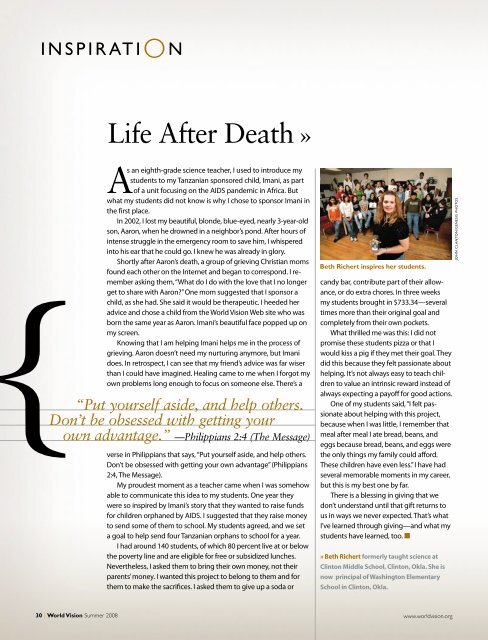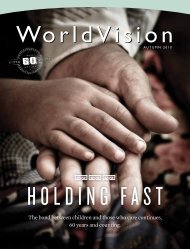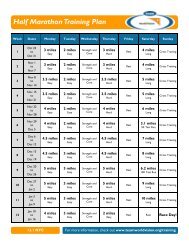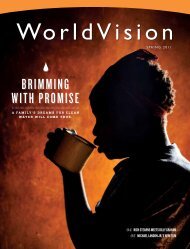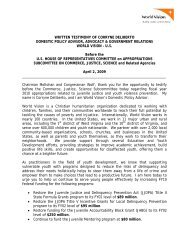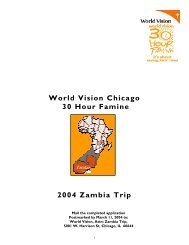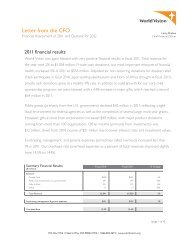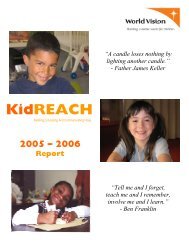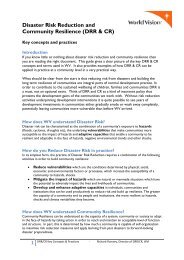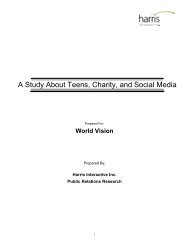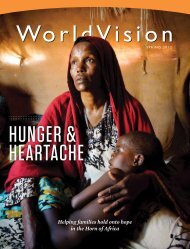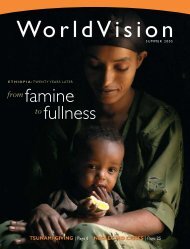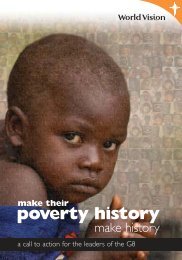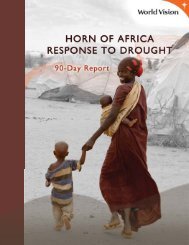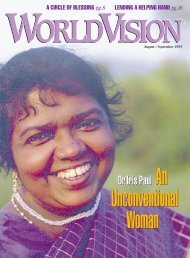Summer 2008: Inside a Sponsorship Community - World Vision
Summer 2008: Inside a Sponsorship Community - World Vision
Summer 2008: Inside a Sponsorship Community - World Vision
You also want an ePaper? Increase the reach of your titles
YUMPU automatically turns print PDFs into web optimized ePapers that Google loves.
inspiratio n<br />
Life After Death »<br />
A<br />
s an eighth-grade science teacher, I used to introduce my<br />
students to my Tanzanian sponsored child, Imani, as part<br />
of a unit focusing on the AIDS pandemic in Africa. But<br />
what my students did not know is why I chose to sponsor Imani in<br />
the first place.<br />
In 2002, I lost my beautiful, blonde, blue-eyed, nearly 3-year-old<br />
son, Aaron, when he drowned in a neighbor’s pond. After hours of<br />
intense struggle in the emergency room to save him, I whispered<br />
into his ear that he could go. I knew he was already in glory.<br />
Shortly after Aaron’s death, a group of grieving Christian moms<br />
found each other on the Internet and began to correspond. I remember<br />
asking them, “What do I do with the love that I no longer<br />
get to share with Aaron?” One mom suggested that I sponsor a<br />
child, as she had. She said it would be therapeutic. I heeded her<br />
advice and chose a child from the <strong>World</strong> <strong>Vision</strong> Web site who was<br />
born the same year as Aaron. Imani’s beautiful face popped up on<br />
my screen.<br />
Knowing that I am helping Imani helps me in the process of<br />
grieving. Aaron doesn’t need my nurturing anymore, but Imani<br />
does. In retrospect, I can see that my friend’s advice was far wiser<br />
than I could have imagined. Healing came to me when I forgot my<br />
own problems long enough to focus on someone else. There’s a<br />
“Put yourself aside, and help others.<br />
Don’t be obsessed with getting your<br />
own advantage.” —Philippians 2:4 (The Message)<br />
verse in Philippians that says, “Put yourself aside, and help others.<br />
Don’t be obsessed with getting your own advantage” (Philippians<br />
2:4, The Message).<br />
My proudest moment as a teacher came when I was somehow<br />
able to communicate this idea to my students. One year they<br />
were so inspired by Imani’s story that they wanted to raise funds<br />
for children orphaned by AIDS. I suggested that they raise money<br />
to send some of them to school. My students agreed, and we set<br />
a goal to help send four Tanzanian orphans to school for a year.<br />
I had around 140 students, of which 80 percent live at or below<br />
the poverty line and are eligible for free or subsidized lunches.<br />
Nevertheless, I asked them to bring their own money, not their<br />
parents’ money. I wanted this project to belong to them and for<br />
them to make the sacrifices. I asked them to give up a soda or<br />
Beth Richert inspires her students.<br />
candy bar, contribute part of their allowance,<br />
or do extra chores. In three weeks<br />
my students brought in $733.34—several<br />
times more than their original goal and<br />
completely from their own pockets.<br />
What thrilled me was this: I did not<br />
promise these students pizza or that I<br />
would kiss a pig if they met their goal. They<br />
did this because they felt passionate about<br />
helping. It’s not always easy to teach children<br />
to value an intrinsic reward instead of<br />
always expecting a payoff for good actions.<br />
One of my students said, “I felt passionate<br />
about helping with this project,<br />
because when I was little, I remember that<br />
meal after meal I ate bread, beans, and<br />
eggs because bread, beans, and eggs were<br />
the only things my family could afford.<br />
These children have even less.” I have had<br />
several memorable moments in my career,<br />
but this is my best one by far.<br />
There is a blessing in giving that we<br />
don’t understand until that gift returns to<br />
us in ways we never expected. That’s what<br />
I’ve learned through giving—and what my<br />
students have learned, too. ■<br />
» Beth Richert formerly taught science at<br />
Clinton Middle School, Clinton, Okla. She is<br />
now principal of Washington Elementary<br />
School in Clinton, Okla.<br />
john clanton/Genesis photos<br />
30 | <strong>World</strong> <strong>Vision</strong> <strong>Summer</strong> <strong>2008</strong><br />
www.worldvision.org


